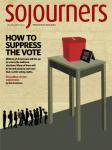WHEN IT COMES to speaking out on sexual violence, the first barrier for pastors is awareness of the problem, according to a LifeWay poll, “Broken Silence.” Commissioned by Sojourners and IMA World Health, the poll—released in June—surveyed Protestant pastors across the United States on their views on sexual and domestic violence. That church leaders don’t often discuss sexual violence is not surprising; for perhaps the first time in the United States, the poll puts numbers to just how few actually do—and illuminates some reasons for the silence.
The lack of awareness of sexual violence is a multipronged problem. According to the poll, 74 percent of surveyed pastors underestimate the level of sexual violence experienced by members of their congregations. In part, this gap reflects a failure to understand the tragic ubiquity of sexual violence—1-in-3 women in the United States, and 1-in-4 men, will experience intimate partner violence in their lifetime. In a country in which 80 percent affiliate with religion, statistics strongly indicate that this issue is as pervasive within congregations as without.
Another problem, however, is around the willingness to believe it is happening. Of the pastors who talk about sexual violence, 72 percent do so because they believe it happens in their local community—but only 25 percent acknowledged that their own congregants may have experienced it.
“It couldn’t happen among Christians” is, sadly, a very common refrain among faith institutions. Reported instances of sexual abuse this year at Christian colleges, from Patrick Henry to Pensacola, indicate the deep costs of this refusal to ask whether sexual violence could happen “within the flock.”
What explains this reluctance to believe the statistics? One cause is gendered views of authority and entrenched attitudes around sex and marriage. For those with theologies that enthrone the man as the head of the household and declare a woman’s purity to be of utmost concern, conversations about healthy, consensual sex are often either distorted or skipped entirely. And when divorce is held as the highest sin for a married couple, a large majority of pastors (62 percent, according to the poll), when confronted with abuse in a marriage, opt to provide couples with counseling and encouragement to stay faithful to their marriage vows—guidance that, without providing avenues for outside help and safety, can prove horribly damaging to the abused.
The good news is that 81 percent of pastors say that they would take appropriate action to reduce sexual violence if they were trained and had adequate resources. This points to significant potential within church leadership for training and education. And resources are available—several Protestant denominations subscribe to “Safe Sanctuary” policies, and groups such as the Faith Trust Institute, Safe Havens, and the Spiritual Alliance to Stop Intimate Violence have been remarkably successful in providing avenues for conversation, counseling, and healing among congregations.
While only 56 percent of surveyed pastors are familiar with local resources and facilities to address violence, they largely indicate a willingness to learn more. For many pastors, this would be enough to significantly improve their ability to respond well.
Yet speaking out ultimately requires the willingness to take action. The poll illustrates this tension around heavily tabooed issues in the church—if awareness is the main barrier to breaking the silence on sexual violence, perhaps the deepest challenge is the willingness to listen. The wave of sex abuse reports from Christian colleges—and the historical obstacles to removing from leadership a pastor with a history of excusing or condoning sexual violence—indicates the difficulty of facing a hard truth that upends what Christians want to believe about their institutions. While 81 percent of pastors say they will speak out with training, a full 19 percent disagree or say they “don’t know.”
For those to whom acknowledging sexual violence in their house is profoundly destabilizing, the greatest challenge is humility. Research shows that the advice of the first person a victim tells will in large measure determine their next steps. Bringing the pain of sexual violence into the light for healing and forgiveness requires those who have encountered it to tell their stories—and the rest of us to listen, with humility, repentance, and support.

Got something to say about what you're reading? We value your feedback!
